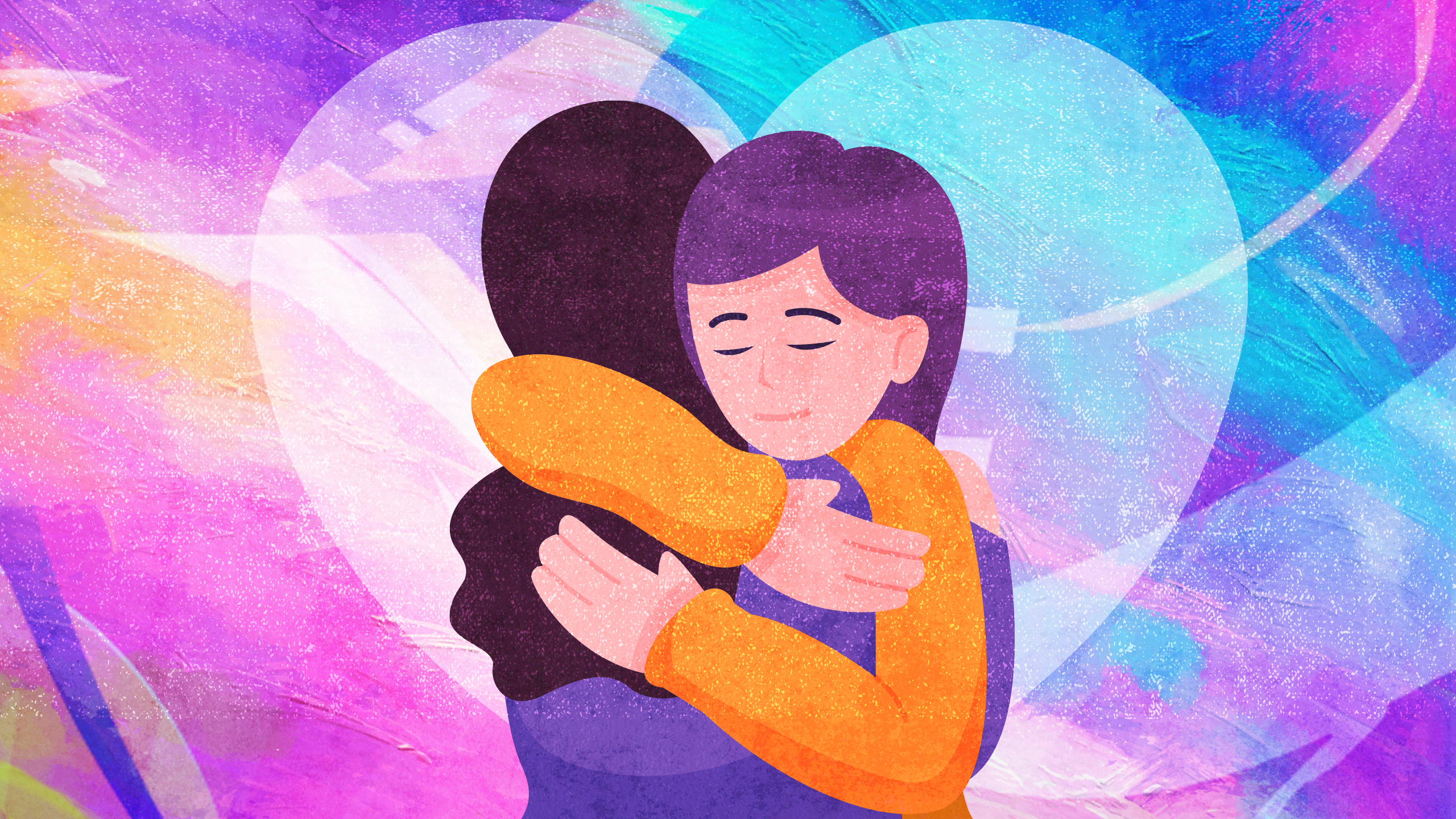
Our Favorite Ways to Practice Empathy in Friendships
You have a friend who is struggling through a tough time, and you don’t know how to be helpful and supportive. What do you do?
Friendships, like any relationships, can be challenging at times. When one of our friends is facing a difficult time in their life, we want to be there for them, but we don’t always know how to support them best. How do you help them, and, better yet, how do they want you to help them?
Figuring out how to be the best possible friend centers on empathy.
What Is Empathy?
Empathy is a term used to describe a wide range of emotional experiences. Researchers generally define empathy as the ability to sense other people’s emotions and to imagine what someone else might be thinking or feeling. It’s best summed up by the saying, putting yourself in someone else’s shoes.
As research into empathy has progressed, two types of empathy have become defined. Affective empathy refers to our sensations and feelings in response to others’ emotions. These responses can include mirroring what the person is feeling, like when we feel stressed when we sense someone else’s fear or anxiety. Cognitive empathy, or perspective-taking, refers to our ability to identify and understand the emotions of other people. If you’ve ever been told that you know how to read people, this is a sign of cognitive empathy.
When we talk about supporting a person during tough times, sometimes we use the words “empathy” and “sympathy” as if they’re the same. Therapists have determined that not only do these two words have vastly different meanings, but how we show sympathy and empathy are very different. Let’s take a deeper look at the differences between them to see why empathy is better for relating with someone who is struggling.
Sympathy is when you acknowledge that a person is struggling with an issue or loss. It’s important to note that sympathy allows you to stay emotionally detached and creates separation from the person who is facing a tough time. Especially when two people are not very close, sympathy shows caring but keeps an appropriate social distance.
It would be best if you strived for empathy with a close friend when they are dealing with a difficult situation. Empathy isn’t easy because it requires you to be vulnerable, listen without judgment, and see yourself in the person’s difficult situation. Empathy can be especially uncomfortable when you are supporting someone in a dark time because you’ll be sharing in those feelings.
Empathy isn’t trying to fix another person but instead listening to their pain and sharing in their difficult thoughts and feelings. By expressing empathy to your friend, you’re inviting them into your innermost feelings and letting them see that you have struggles of your own. Sharing like this builds a connection that allows them to trust you and share what their feelings are because they feel you understand them.
Why Is Empathy Important?
While people can be in tune with their own feelings and emotions, getting into someone else’s head can be difficult. The ability to feel empathy allows you to understand the emotions that others are feeling, giving you more of a connection with them.
Empaths tend to be seen as good listeners, and people will often be drawn to them when looking for advice or someone to share their problems with. Because of this, empathetic people can find themselves getting overwhelmed in social situations or during tragic events due to how deeply they feel things. Empaths can also struggle with setting boundaries, as they feel like they need to make themselves available to those in need at the expense of their own needs. They can also get burnt out quickly because of how intensely they feel emotions and concern.
Despite these potential issues, having empathy is still very important. It allows you to build social connections, which research shows is vital to personal and psychological health, as you can read and respond to people effectively. Empathizing can also help you regulate your own emotions better, giving you more emotional stability. While being empathetic can lead to people seeking your help, it can create a cycle where people are willing to reciprocate by helping you in response.
Join In 200 Million+ On The Journey to Greatness
How Can You Show Empathy? Here Are Some Ways!
Showing empathy is having the ability to visualize yourself in a person’s situation as if you were living it. Being empathetic can still be challenging, though, as an individual’s experiences color how they deal with struggle. It could be easy to support a friend after they lose a parent if you’ve experienced that type of loss, too. But it’s more difficult to help someone cope with the loss of their job if you’ve never been fired.
Even if you’ve never experienced the same type of situation that you’re trying to help someone navigate, there are still ways to be empathetic to them.
#1: Your Goal Should Be to Understand
Most people dealing with an intense situation just want someone to talk to, but that doesn’t mean you shouldn’t be actively listening. Let them vent for as long as they need to without interrupting to try and offer advice at every opportunity. You can always do that later in the conversation, but people who are overwhelmed usually just need to unload to help them feel better. If you pay close attention not only to what they’re saying but how they’re saying it, you may pick up on cues to help you be more supportive.
#2: Ask Questions With a Genuine Interest in the Answer
It’s easy to ask someone, “How are you doing?” as a way to be polite, but to be empathetic, you want to know the answer! The core of empathy is curiosity, so if you really want to understand someone, you need to dig deeper. Instead of just asking how their day went, let them tell you about something interesting that happened to them. This simple act not only builds a rapport but also makes the person feel like they matter and that someone cares.
#3: Don’t Offer Advice Unless They’re Asking for It
People who share their problems are not necessarily looking for advice from you. Sometimes they just need a friendly ear to listen to them. When possible, avoid offering unsolicited advice because it might not have the effect you think it will. Remember, people enduring a tough time want someone to understand them, not somebody telling them what to do.
#4: Acknowledge Their Feelings
Everyone’s feelings are valid, even if they’re not the same as what you would feel in their situation. Regardless of whether you agree with someone else’s beliefs and decisions, to be empathetic, you need to accept them. Reassurances like “It’ll be okay,” can actually make them feel like their feelings and emotions aren’t valid. Telling them, “I can only imagine what you must be going through,” shows that you acknowledge their feelings and that it’s understandable for them to feel that way.
#5: Share a Similar Experience When Possible
Practicing empathy is a two-way street. It may seem like you should focus on the other person, but sometimes it helps to share your experience in a similar situation. Doing this can help the other person get a different perspective on their situation. Just be careful not to make the conversation about you. It should be a sharing of experiences and perspectives so you can both learn from each other.
#6: Ask Them How You Can Help
If you want to show someone you understand their struggle, offering your help is an excellent place to start. Telling them that you’re here for them or that you’re willing to listen whenever they need help can reassure the person that they have support. If you make the offer to be a helpful outlet for them, understand the commitment you’re making, and follow through if they reach out. This will make them feel that you really are sincere and that your words aren’t empty.
You Can Be Someone’s Hero
Being able to sense another person’s emotions and imagine what they’re thinking and feeling makes empathy sound like a superpower. Empathy is really just being attuned to others, reading the cues they’re giving when they struggle, and offering an ear. Listening is the true superpower.
It can be physically and emotionally draining to show empathy, but it’s incredibly rewarding, too. Everyone wants to feel as though they are helpful and supportive, and empathy is a great way to do those things. Showing empathy to another can make you their hero coming to their aid and saving them from being overwhelmed!
The Greatness team wants to help you be a better, more empathetic person. Jay Glazer discusses how to make vulnerability your greatest strength here. Empaths can feel deeply, and our article, 7 Emotional Agility Tools to Better Navigate Panic Overwhelm can help you regulate your emotions. Dr. Esther Perel can help you navigate the highs and lows of your relationships here.
Being there for someone when they need it most is being great!
Greatness Authors
Greatness Authors is a collection of writers, thinkers, curiosity experts, and students of the world who are committed to bringing you the most up-to-date, impactful, and inspiring information surrounding Greatness topics.

Do You Have to Be a Morning Person to Be Successful? Here’s What Both Sides Have to Say

9 Reasons You’re Tired All the Time & How to 10x Your Energy

How to Have a Healthy Romantic Relationship Even if You Share Different Beliefs

The 7 Best Vitamins to Naturally Promote Better, Uninterrupted Sleep According to Shawn Stevenson

The Science of Forming Healthy Habits & Letting Go of Bad Ones, According to Author James Clear










